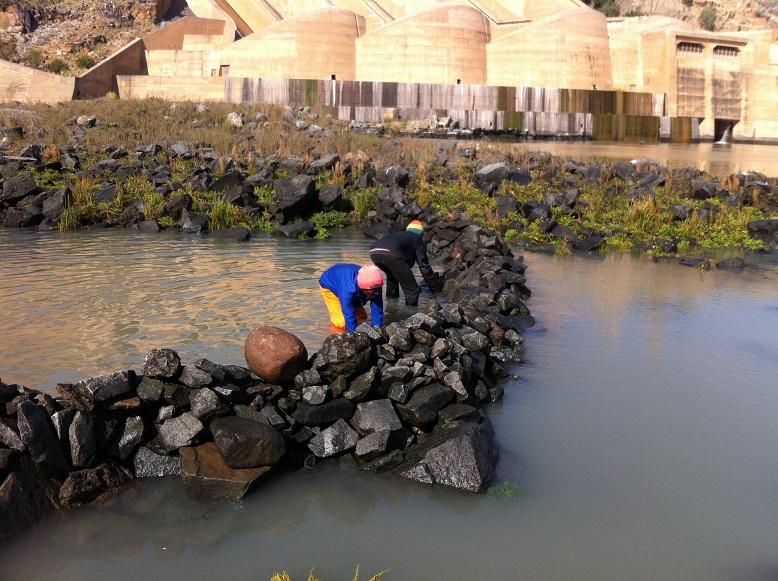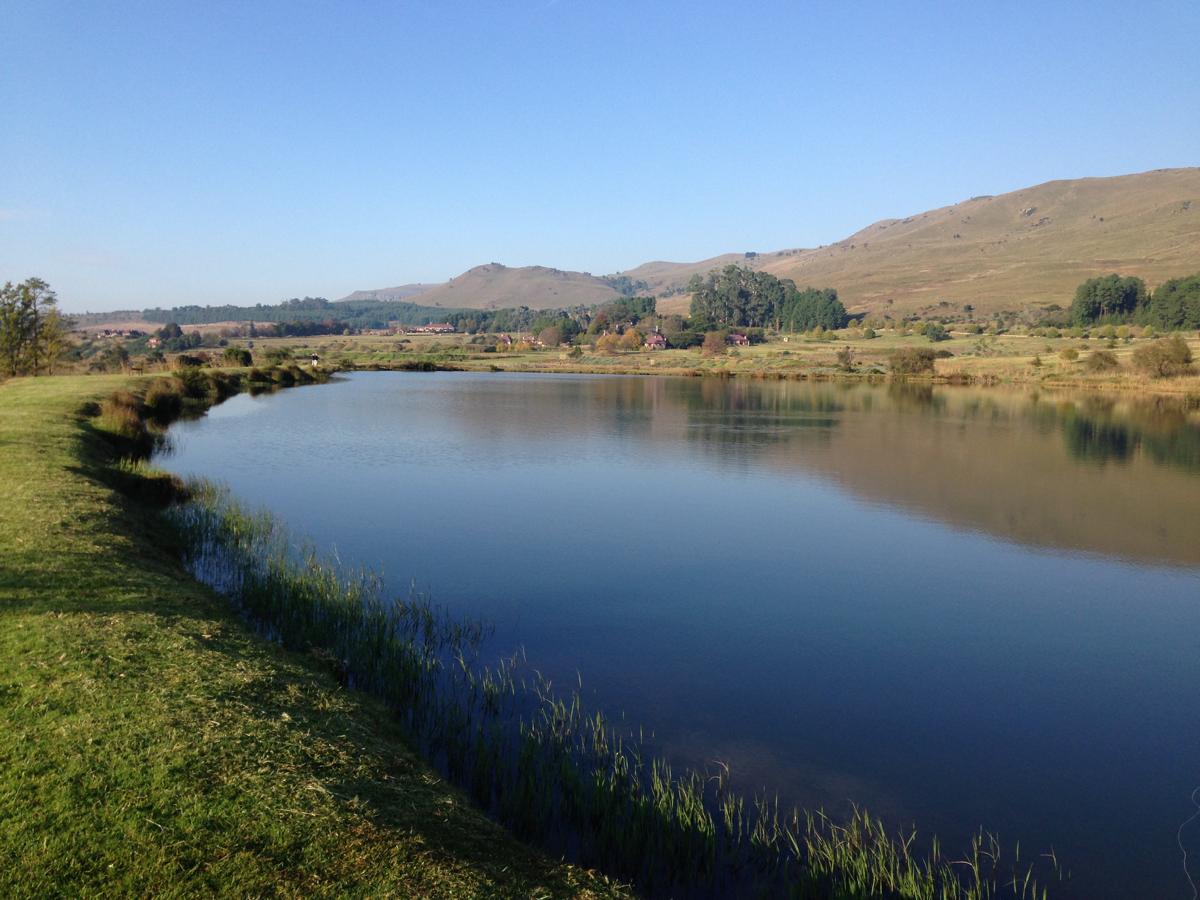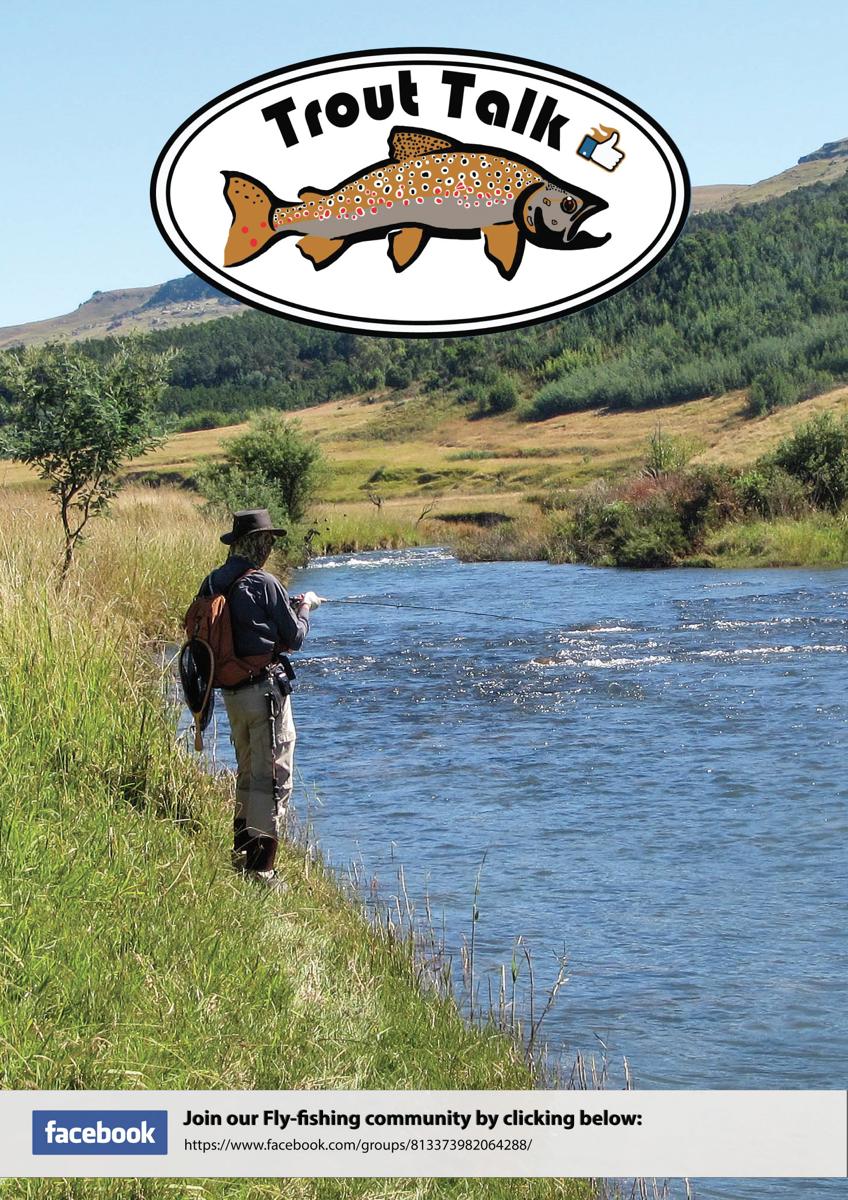
10 minute read
Merrily down the stream by Ian Cox
Row, row, row your boat Gently down the stream Merrily, merrily, merrily, merrily Life is but a dream.
The September 2019 edition of the Flyfishing and Flytying magazine features an article about the ongoing conflict between recreational anglers and canoeists in the United Kingdom. I would not mention this in a South African context save that it speaks to many of the issues driving the conflict between anglers and small scale fishers in South Africa.
Advertisement
The public right to access rivers in the United Kingdom is heavily restricted. Public rights of access are limited to navigable tidal rivers and to the small number of rivers were public use has existed since time immemorial. This applies equally to the right to fish or canoe on these rivers or indeed any other use.
As I mentioned in the July 2019 edition of this magazine, English common law reposes the right to access, and thus exploit, most of Britain’s rivers in the hands of riparian landowners. The result is that a tiny proportion of Britain rivers are truly open to the public.
This is also the legal position in South Africa as far as fishing is concerned. However, it is not the case when canoeing on rivers. Roman Dutch law applies to canoeists and it grants a general right of access that British canoeists are fighting for. The right to canoe South Africa’s rivers was recognised over 30 years ago in the case of Butgereit v Transvaal Canoe Union.
The South African legal position is thus an anomalous one in that sometimes Roman Dutch law applies and sometimes it does not. It is hard not to conclude that South African law makers adopted the English law regime opportunistically where this enabled landowners to limit a general right of access to private properties.
Anglers in both the United Kingdom and South Africa have overcome this impediment by entering into agreements with land owners, including the state, which allow clubs and/or syndicates privileged access to these waters. Many of these arrangements are longstanding. In some cases where state land is involved, they have been formalised into laws or policy.
For example, Jake Alletson writes in Greenheart to Graphite of trout acclimatisation societies being encouraged by government in what was then Natal as a means of allowing select members public to gain access to the Provinces state funded trout waters.
The British government has encouraged canoeists to enter into the same sort of arrangements that anglers have done but this is proving easier said that done. These efforts are often frustrated by the existing preferential arrangements enjoyed by anglers who actively oppose giving rights to canoeists if there is any risk that this may compromise the rights enjoyed by anglers.
This has resulted in British canoeists questioning the fairness of the underlying law. Canoeing bodies in Britain are now claiming that they enjoy the same sort of rights of use as those enjoyed by South African canoeists. Anglers dispute this. British law is on the anglers’ side but the law which is rooted in ancient English common law is looking increasingly anachronistic and indefensible.
British canoeists are becoming intolerant of the legal position and are increasingly acting as if they have the rights they claim.
The result is increasing levels of conflict between canoeists and anglers in the United Kingdom. The British government is telling anglers and canoeists to sort their differences out but if the article in Flyfishing and Flytying Magazine is anything to go by, it seems that positions are hardening. This is most unfortunate. with rod and line. These permits are not easily obtained especially by people who live in the kind of poverty that characterises small scale fishing. This makes small scale fishing is a criminal offence in South Africa to all practical intents and purposes.
Thus, in many ways, South Africa’s small scale fishers find themselves in the same boat as canoeists in the United Kingdom.
For example, both complain claim that they are being discriminated against by laws that are inherently unjust. They both claim both claim that it is wrong to place access to this public resource in private hands especially when this results inequitable rights to access and use the resource.
Anglers in South Africa and the United Kingdom both ignore these complaints choosing instead to invoke the law regardless of whether this is fair.
However, this similarity ends with a uniquely South African twist.
While fresh water fishery laws are characterised as conservation laws, it is very easy to show that they have they have the effect of depriving black people from access to the fishery. Anglers and conservationists deny this, but the proof is easy to find.
South African anglers are not in conflict with canoeists. They have a different enemy in the artisanal or small-scale fishers who catch fish otherwise than with rod hook and line.
Recreational anglers, including a significant constituency with the flyfishing community, routinely condemn small scale fishers as poachers and criminals.
There is some technical justification for this accusation. You need a permit to lawfully fish South Africa’s fresh waters otherwise than
An egregious example is to be found in the law the Cape Colonial Government introduced 1890’s banning the use of fish kraals completely. This is an ancient fishing method that was practised on the Orange river as far back as the 1780’s. Yet this law is still on the statute books in some provinces.
Worse still it is being used to justify anglers taking the law into their own hands by destroying these fish kraals wherever they find them.


The inherently discriminatory nature of South Africa’s provincial conservation laws was explicitly recognised in the Scoping Study on the Development and Sustainable Utilisation of Inland Fisheries in South Africa that was prepared in 2015 by a multidisciplinary team of academics headed Professor Britz. He is the former dean of the Department of Ichthyology at Rhodes University.
That report, which has been widely praised, opens with this observation:
South Africa’s inland fishery resource endowment has been overlooked as a means of supporting sustainable livelihoods in the democratic era, lacking a guiding policy and legislation aligned with the country’s rights based Constitution. The absence of an equitable inland fishing governance framework with defined user rights has resulted in growing unmanaged and unsustainable fishing practices, conflicts between resource users and the perpetuation of Colonial- and Apartheid-era exclusion of rural communities from livelihood and economic opportunities linked to aquatic natural resources.
It is not surprising, therefore, that ignoring these laws has become an act of moral disobedience for small scale fishers regardless of what adverse the impacts on resource sustainability may be. Furthermore, government often lacks the capacity or the will to enforce these laws. The result is that poaching has become rampant on state owned waters even in protected areas such as Kosi Bay. The sustainability of the fishery and the value that reposes in the fresh water fishery resource are being compromised as a result of this.
This should encourage a reassessment of strategy but that is not happening. Anglers are doubling down by using this threat as an excuse for calling for stiffer laws that further entrench the preferred position of anglers. The are unrepentant in their view that small scale fishers are criminals.
Environmental authorities are not averse to this approach especially when it encourages increased state control over biological resources.
The 2nd Draft National Freshwater (Inland) Wild Capture Fisheries Policy Framework for South Africa confronts these questions head on. This policy proposes drastic reform that will deprive riparian owners of their exclusive rights in respect of the fresh water fisheries resource. At the same time, it promises a more equitable sharing of the resource and the decriminalisation of the status of small scale fishers.
Anglers and land owners will be horrified but truth be told it is difficult to criticise from a constitutional or even a common law perspective. Indeed, The English law based modifications to our law that give landowners exclusive rights to the fresh water fishery can easily be dismissed as a foreign aberration that was adopted because it helped keep black people off privately owned land.
The problem with the policy lies not so much in the pudding but in its eating.
The changes proposed are radical ones that will detrimentally affect significant value chains that have developed around the rights that landowners presently enjoy. The value chains that have developed around flyfishing for trout and yellowfish are obvious examples of this. But this is the tip of the iceberg.
Agriculture and game ranching which are both heavily dependent on controlled access are also likely to be severely affected if the public are allowed access to private property for the purpose of fishing.
The idea of the fisheries resource being managed as public property is not an indefensible one, but it does place a heavy burden on government to exercise its custodial powers responsibly. And therein lies the problem. `There is very little chance that this will happen given government’s appalling track record regarding resource management.
Radical reform such as that envisaged in the policy requires a massive investment if it is to be undertaken successfully. But the policy is silent on this. Government has ignored its own rules and failed to carry out the required strategic economic assessment survey. Moreover, the already pitifully small fisheries budget is reducing making it very unlikely that government will ever have the resources to responsibly implement this policy.
This all suggests that this may well be another case of “pillage the village” policy making. Anglers hoped that the economic value of angling would encourage government to protect the value chain. But the opposite is likely to be true. I fear that it has made the angling value chain a target.
It makes my blood boil when I think of this, but it is very likely that small scale fishers are being used to justify what is really and exercise of increasing state control so that “big men” can extract rents from the value chains that have developed around recreational fishing.
What makes me even more angry is the fact that anglers are making it easy for government to do this. Angling has invited these measures by refusing to recognise the claims of small scale fishers to share in South Africa’s fresh water fishery. I fear this dog in the manger attitude is going to cost the country dearly.
Anglers in this country and the United Kingdom both cite conservation reasons for maintaining the status quo. British Anglers have alleged, for example that canoeists disturb the fish. Subsequent studies, however revealed that this was not the case and that it was in fact anglers who were disturbing fish. South African anglers denounce small scale fishing as unsustainable while at the same time opposing research aimed at determining if this is indeed the case. Thus, SACRAA’s John Pledger claims that it has invested R1,5 million in opposing the small scale fisheries project currently underway at Van Der Kloof Dam....This is indefensible.
The British government has called upon stakeholders to sort their problems, so it won’t have to. The South African government has not extended that invitation to stakeholders in the South African fresh water fishery. It shows every indication that it intends exploiting the conflict to suit its own ends.
Anglers must recognise that the current legal position that gives anglers preferred access to the fishery is untenable. Anglers need to change, and they need to do so quickly if all of this is not going to be a fait accompli.
I think that a different more inclusive approach is required. Perhaps anglers should reach out to small scale fishers with a view to finding common ground instead of branding them criminals. Small scale fishers are asking anglers to do so but there is a great deal of concern in the angling community whether this is the right thing to do.

Traditional fish kraals












